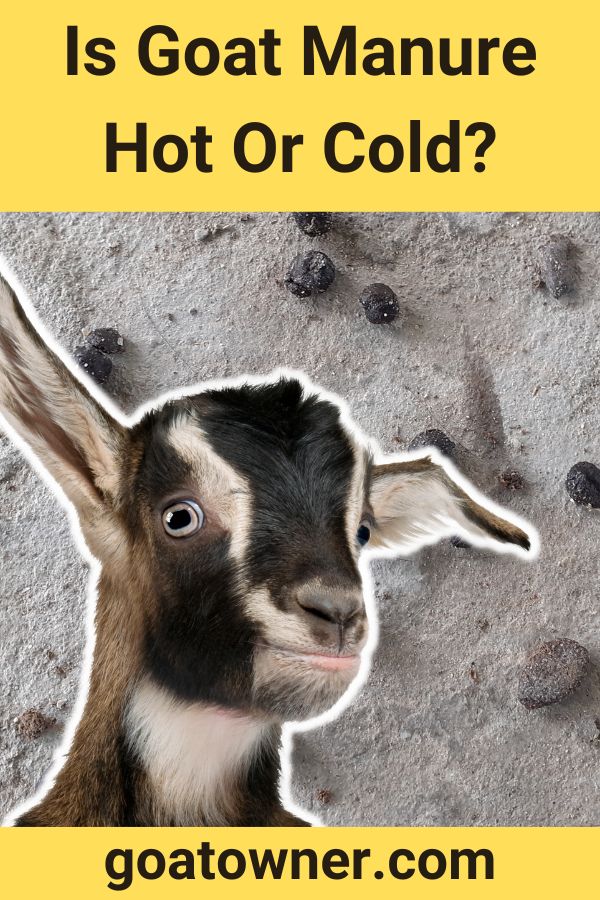Chemistry lessons come into play when using manure much more than we might first think.
It can be confusing to keep track of everything you need to know about manure, most importantly whether the particular kind of manure we are using is considered “hot” or “cold”.
Goat manure is often a big question mark for goat owners—so is it hot or cold?
Goat manure is considered cold manure. It will depend on how readily available the nitrogen is, but goat manure is usually lower in nitrogen than other manures. This usually makes it safe to fertilize plants without first composting. It also has a balanced pH level.
So, goat manure is definitely cold manure.
Unlike, say, chicken manure, which can burn plants if you use it to fertilize especially below the soil, goat manure is safer in this way.
Let’s look further into this.
How hot is goat manure?
Goat manure is not considered hot at all, but cool.
It is relatively low in nitrogen, which is what makes manure hot as opposed to cold.
Chicken manure, for example, has one of the highest nitrogen levels of any manure.
Goat manure is much more well-balanced, with far less salt and a more equalized pH level.
The lack of acidity also helps in cooling it down and in its relationship with plants.
That said, any manure has the potential to burn plants if it is too high in nitrogen.
Virtually any time of the year you can use it as a surface fertilizer, and most of the time it’s really good in compost too.
But goat manure is not hot, both in the sense that it is low in nitrogen and low in natural pH levels.
So, how do you make use of it as fertilizer?
How do you use goat manure as fertilizer?
You have a variety of options for using goat manure as fertilizer.
As I said, because of its naturally low nitrogen and pH balance, you can use it either as a surface fertilizer or a root fertilizer.
It can be as simple as just spreading the manure itself directly onto the plant or flowerbed.
This will eventually get absorbed by the soil and then by the plants.
They will grow quicker and more fully.
But you can also dig it into the ground to directly fertilize the roots.
This is a bit riskier, though, if we’re being extremely cautious.
Experiment with a plant or two and see how they react to the goat manure at their roots.
You can also compost the manure first so that you then have high-quality compost to spread for the plants.
This will eliminate any chance of the nitrogen being too much for the plants, and ensure that they don’t get burned.
In any case, you are at a far reduced risk of this with goat manure.
Chicken manure, as I’ve mentioned, is considered one of the best fertilizers, but because of the nitrogen content and pH balance, it must be composted before you can use it as fertilizer.
Goat manure can be spread pretty much any time of year on your plants.
Can you put goat manure straight in the garden?
Yes, you can, although it’s always sensible to try it out first.
Take a small patch of garden, spread some goat manure straight on it, and see how the plants react over the next few weeks.
It’s very unlikely that there would be any adverse effects, but it’s always best to make sure.
As I said, goat manure can vary in chemical makeup.
Once you’ve done this and see that the plants are fine, you can always add goat manure straight onto the garden.
Don’t overdo it, though—your plants only need so much fertilization. Just make sure they get topped up semi-regularly.
What animals have cold manure?
You won’t be surprised to learn that a lot of the animals that have cold manures are highly goat adjacent, if not directly related.
Llama and alpaca manure, for instance, is considered cold,
And can be directly added to newly planted soil.
Cows and sheep also have cold manures, though cow dung is somewhat hotter than goat, generally speaking.
Rabbit manure is also cold manure, so again, you don’t have to let it age or compost it before you can use it in your garden.
It can just go straight on.
So, which animals have hot manure?
Which manure is the hottest?
The hottest manures tend to come from omnivorous animals, such as chickens and pigs.
These manures are extremely high in nutrient content, and thus are very hot.
They must be composted and otherwise prepared before they can be added to soil, lest they burn the plants you are trying to fertilize.
Hot manure is, paradoxically, often considered the best kind of fertilizer when prepared right.
The high nutrient content makes it highly beneficial to the plants, but only if it is composted to break down the nitrogen and pH balance.
Chickens have the hottest manure.
Goat manure is much safer than other common options, then, but you should still always be wary when you first start using it.
High nitrogen content in one particular sample of goat manure could lead to burning, though this is highly unlikely.
Generally speaking, goat manure makes great fertilizer for your garden, so be sure to put it to use!

